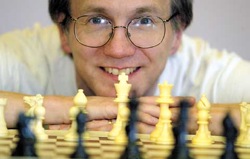Two years ago, American chess fans were justifiably proud and thrilled when our team brought home the gold in the 2016 Chess Olympiad. However, it’s worth remembering that we actually won by the slimmest possible margin on tiebreaks; the outcome of one game on the 25th board made the difference between the U.S. winning on tiebreaks and Ukraine winning on tiebreaks. It was a cruel stroke of fate for the Ukrainian team, whose record of 10 wins and 1 loss (against the U.S.) would have won almost any other Olympiad.
This year, the Americans returned to the Olympiad with exactly the same team that had won the gold in 2016: Fabiano Caruana on first board, Wesley So on second, Hikaru Nakamura on third, Sam Shankland on fourth, and Ray Robson as alternate. This time we were top seed, thanks to the remarkable results of Caruana and Shankland this year that have moved them up to #2 and #28 on the world rating list. I was very optimistic that we would win again, especially after our stirring win in round 8 against Azerbaijan put us in clear first. A particularly memorable game was Caruana versus Shakhriyar Mamedyarov on top board, the world #2 against the world #3, the two highest rated players in the tournament because Magnus Carlsen didn’t come.
Often in such a case you would see a tepid draw, but in a complicated R+Q versus R+Q endgame, Caruana played a queen sacrifice to force mate in three! After that, plus a gutsy endgame win by Shankland, I really thought it was our year.
But the U.S. team stumbled in round nine, losing to Poland and dropping out of first. In round ten, though, Poland lost to China. Thus, going into the last round, the U.S. and China were tied for first with match scores of 8½-1½. The U.S. was ahead on tiebreaks, so it’s possible that the team members and captain John Donaldson felt safe in playing for a draw.
In any event, four draws were exactly what happened. And that is when chess karma came back to bite us. I’d like to see an explanation of how this happened, but even though the match was tied, China’s tiebreak score improved much more than ours did. I think that the basic problem is that the U.S. did not play a very strong schedule until the last four rounds. The first tiebreak depends a great deal on the scores of your opponents (which is why one game on board 25 had made such a difference two years ago), and apparently our opponents did a collective face-plant in the last round. So China moved past us to take the gold, and the U.S. had to settle for silver.
Russia completed a late-round comeback by beating France to tie for first as well, but their tiebreaks were even worse than ours, so they got the bronze medals. Poland could still have won the tournament if they had beaten India in the final round, because they had better tiebreaks than everyone except for 15th-place Azerbaijan! However, that match also ended in a 2-2 tie with four draws, so Poland missed the medals podium. In fact, on the top four boards 15 out of 16 games ended in draws, with Ian Nepomniachtchi’s victory over Etienne Bacrot being the only exception.
Interestingly, the three top-rated teams (#1 U.S., #2 Russia, #3 China) ended up in a three-way for first, although for a very long time it appeared that would not be the case. Both Russia and China had to fight back from early defeats. (Russia lost to Poland in round 4, and China lost to the Czech Republic in round 5.) As for Poland, like the Ukrainian team two years ago, they probably deserved better than they got. They beat some really good teams — the U.S., Russia, Ukraine, France — and drew against Armenia and Azerbaijan. But only one team can win, and this time it was China’s year.
(Afterthought, added a half-hour later) One thing weird about this year’s Olympiad was that the three top teams barely played one another. There was no U.S.-Russia match, no China-Russia match, and the U.S.-China match took place only in the final round when both teams had a strong incentive to play for a tie. Speaking as a fan, I wish that we could have had one or two more rounds.


